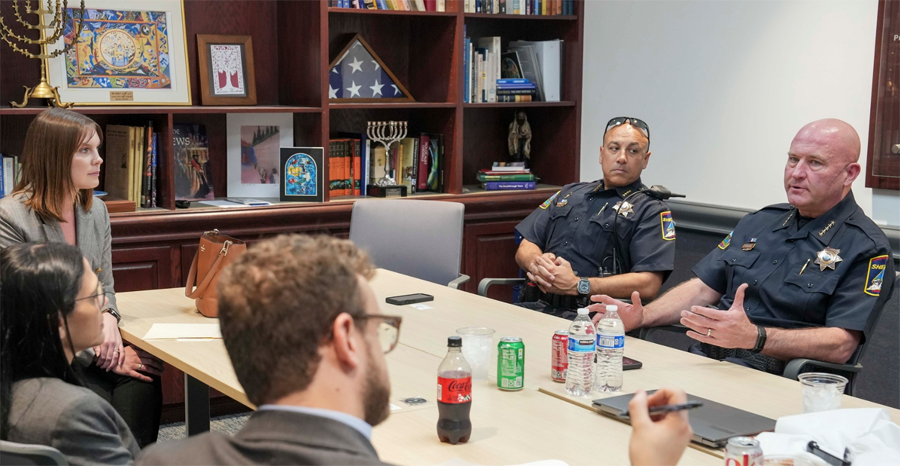
Sheriff Austin Garrett, right, visits with Israeli consul general of the Southeast United States and an FBI official for a “roundtable discussion” on “challenges facing the Jewish community,” namely “the growing threat of antisemitism” and “how partnerships with local, state, and federal law enforcement” can play a ‘key role in fostering safety, respect and unity.” But Sheriff Garrett ignores demands that false imprisonment, false arrest practices be halted. (Photo HCSO) community.
CHATTANOOGA, Tenn., Thursday, Feb. 13, 2025 — My lawsuit against Hamilton County and sheriff Austin Garrett seeks to protect deputies such as Brandon Bennett from the hazard of making arrests without the protection of a warrant.
My lawsuit filed in federal court in Chattanooga on Nov. 19, 2024, highlights the danger of ignoring arrest warrant law, exposing the deputy personally if the arrest he makes is a botch and is dismissed, as was mine, a traffic arrest premised ostensibly on a damage taillight.
Deputy Bennett makes the arrest without a warrant and without probable cause. His prosecution of me as a criminal is dismissed by the district attorney’s office run by Coty Wamp. Criminal court judge Amanda Dunn orders the charges expunged.
Mr. Bennett effectively kidnaps me on his own personal authority based on his own personal opinion, also based on his training.
‘Will arrest and prosecute’
Says Sheriff Garrett on the department website, “responsibilities of the traffic division include routine patrol for deterrence and enforcement of traffic violations, as well as investigation and reconstruction of vehicle crashes (with special emphasis on those which involve serious injury and/or death.) The traffic division will arrest and prosecute when the evidence of a traffic violation requires.”
My arrest Nov. 22, 2023, falls under this rubric. It is my contention in my federal case that the constitution does not permit arrest-on-sight practices for such alleged misdemeanors because they are not public offenses.
Quick take ———————–
— If arrest possible in traffic case, citizen has right to hearing in agency
— Surplus arrests rise from ignoring “exceptions” law regarding necessity for arrest warrant
— Harm to public must be stopped
I claim that the motor vehicle laws are administrative in nature, and that the state, as moving party, must exhaust its administrative remedies that I have a right to have it exhaust in making claims against me under its license. I have a Class D driver license, and all cases pertaining to the use — or alleged misuse — of a license are matters to be heard under the UAPA. That is to say, the uniform administrative procedures act under which contested cases are held.
A contested case is an administrative case, not a criminal case. The traffic allegations, I aver, must occur there, and I have a right to demand state of Tennessee, as purportedly injured party, has a duty to prosecute me there first — in the agency overseeing driver licenses. That’s the department of safety.
That sheriff’s office and police departments convert administrative breaches regarding licenses instantly into criminal matters, with arrest and jailing as part of the show of indignation, are a due process violation against the citizen.
I am doing what Vladimir Bukovsky did in the Soviet Union during his sentence in the Gulag. He forced the system to operate in its detail, in its exhaustive complexity, nearly bringing down the government from insane internal pressure.
Forcing system to follow its own rules
Since fraud operates at the heart of commercial government, it can be forced to work its own rules to their logical end, which means the system locks up. Under constitutional government, criminal cases would be upon true malefactors, and not against people for “paper crimes” or technical glitches or malfunctions on their automobiles.
The courts have blocked reform of traffic abuse practices, using the legal fiction that “all travel is commercial” and “no private travel exists apart from change of domicile interstate.” This fiction in Tennessee is built upon a judicial trick sentence in State v. Booher, 978 S.W.2d 953 (Tenn. Crim. App. 1997). The case says regulation of transportation, the rules upon or-profit trucking and hauling, don’t implicate the right of travel. But every cop, every DA, reads this case and “knows” that private travel doesn’t exist, and that the only free use of the public right of way is moving your house and address from one state to another.
Traffic stops are the most dangerous for cops and depputies of all encounters they have with the public. They account for the most injuries and deaths to cops. They almost always are premised on a flawed use of the law, a poaching upon the law that is at the state level, used by troopers of the department of safety, or like agency. They are opportunistic acts, practices that self-justify local departments, are useful in marketing departments and their budgets. They increase violence, harm to the public, and do not further the state health, safety and welfare interest except at the most superficial level.
The Tulis arrest is typical among thousands across my home county. The deputy gets no warrant to protect himself in seizing me. He does it on his own authority, and the alleged crime isn’t a felony and isn’t a “public offense,” which latter allows for warrantless arrest.

